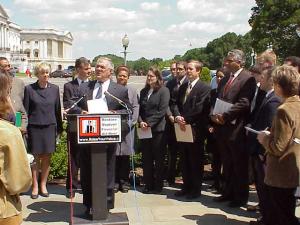Drug War Issues
Politics & Advocacy
Advocates of drug policy reform are losing a key ally on Capitol Hill. Rep. Barney Frank (D-MA) announced Monday that he will not seek reelection and will retire at the end of this term in January 2013.

Barney Frank at press conference calling for repeal of a law that denies financial aid to students because of drug convictions
Beginning in 2001, Frank repeatedly introduced bills that would block the government from intervening in states with medical marijuana laws, and since 2008, he has introduced bills that would decriminalize marijuana possession. This year, he teamed up with libertarian Republican Rep. Ron Paul (R-TX) to introduce the Ending Federal Marijuana Prohibition Act. That bill currently has 19 cosponsors.
Frank was also the lead sponsor of the "Removing Impediments to Students' Education" act to repeal a provision added to the Higher Education Act in 1998 that delays or denies federal financial aid to students because of drug convictions. The law was scaled back in 2006 to apply just to offenses committed while one is in college and receiving aid, and in 2009 the House of Representatives passed language as part of a student aid funding bill that would have limited it further to just sales convictions. (The section of the 2009 bill containing that language was stripped as part of Democrats' strategy to pass health care reform, in which the health care reform and education bills were combined.)
In 1994 Frank was one of four members of Congress, a Democrat and Republican from both the House and Senate, who advanced "safety valve" legislation to allow judges to exempt first-time drug offenders from five- and ten-year mandatory minimum sentences under specified circumstances.
None of his marijuana law reform bills have come close to passage, but Frank gets big kudos from the reform community for his tireless efforts. His sponsorship of marijuana reform legislation has helped change the conversation in Congress, a process he admitted in a 2009 interview with Esquire is still far from complete.
"Announcing that the government should mind its own business on marijuana is really not that hard," he said. "There's not a lot of complexity here. We should stop treating people as criminals because they smoke marijuana. The problem is the political will. This is a case where there's cultural lag on the part of my colleagues. If you ask them privately, they don't think it's a terrible thing. But they're afraid of being portrayed as soft on drugs."
Frank's bold and straightforward stance has helped begin to change that, but with his impending retirement, marijuana and larger drug policy reform will lose a champion in Congress. His seat may remain Democratic, but there are few Democrats who have been as good as Barney Frank when it comes to trying to end the drug war.
This work by StoptheDrugWar.org is licensed under Creative Commons Attribution-ShareAlike 4.0 International
Add new comment